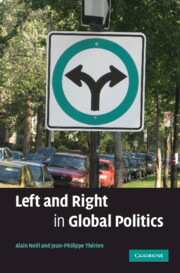Book contents
- Frontmatter
- Contents
- List of tables
- List of figures
- Acknowledgements
- Introduction
- 1 A clash over equality
- 2 A worldwide value divide
- 3 Two tales of globalization
- 4 The rise of the modern state system (1776–1945)
- 5 The age of universality (1945–1980)
- 6 The triumph of market democracy (1980–2007)
- 7 Twenty-first-century rapprochement
- 8 The core currency of political exchange
- Conclusion
- Index
- References
6 - The triumph of market democracy (1980–2007)
Published online by Cambridge University Press: 05 September 2012
- Frontmatter
- Contents
- List of tables
- List of figures
- Acknowledgements
- Introduction
- 1 A clash over equality
- 2 A worldwide value divide
- 3 Two tales of globalization
- 4 The rise of the modern state system (1776–1945)
- 5 The age of universality (1945–1980)
- 6 The triumph of market democracy (1980–2007)
- 7 Twenty-first-century rapprochement
- 8 The core currency of political exchange
- Conclusion
- Index
- References
Summary
On November 8, 1989, a faltering East German government declared, in a context of mass protests and massive departures through Hungary and Czechoslovakia, that the Berlin Wall no longer stood as an obstacle to the free movement of its citizens. Crowds coming from the East and the West joined together in celebrations, and undertook to demolish the most offensive symbol of the Cold War. Less than a year later, the German Democratic Republic disappeared and Germany was reunified. Throughout Eastern Europe, communist regimes collapsed, and were replaced by electoral democracies committed to re-establishing market rules. In December 1991, the Soviet Union itself ceased to exist, to be replaced by a Commonwealth of Independent States, engaged in a process of democratization and liberalization. In China, the ruling Communist Party resisted such attempts at democratization, killing several hundred students to crush a protest in Tiananmen Square. The regime nevertheless pursued a policy of economic liberalization that reintroduced market mechanisms in the world's largest communist country. Except for a few marginal cases – including North Korea, which became the first hereditary communist dictatorship – “really existing socialism” as a project of totally state-controlled, planned economy had ceased to exist.
In the South, the 1980s and 1990s were also a triumphant era for both the market and liberal democracy. The turn to democracy started in Southern Europe in the late 1970s and in Latin America in the 1980s.
- Type
- Chapter
- Information
- Left and Right in Global Politics , pp. 137 - 165Publisher: Cambridge University PressPrint publication year: 2008



